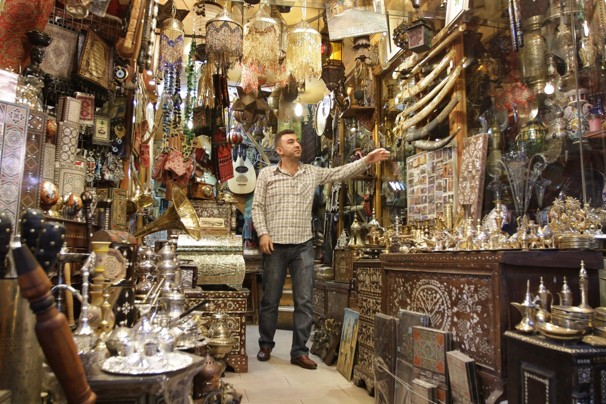The Ayenor boutique hotel in Damascus has a fountain splashing in its sunlit courtyard and four-poster beds in $100-a-night rooms that were usually full, until three months ago. Now, every room is empty, and the manager sadly offers discounts to any visitor prepared to brave the violent unrest in Syria and stay in the capital.

The wave of protests and the brutal government response, which human rights activists say has killed more than 850 people, are all but invisible in the center of Damascus. More striking here is the emptiness of streets lined with stores selling pottery, jewelry and carpets. Salesmen sit idly playing backgammon and have time to drink tea and complain that their businesses have been ruined by the “problems.”
The death of tourism is the most visible sign of major economic damage from the protests and crackdowns, damage that could eventually undermine the government of President Bashar al-Assad.
The economic instability is forcing the government to increase its deficit to fund promised concessions, though such fiscal problems are unlikely on their own to bring down a regime that has survived hard times and diplomatic isolation before. However, economic damage could prove decisive in spurring new sectors of society to join opposition movements.
One Western diplomat said a collapse in financial markets could push the merchant classes in Damascus and Aleppo to join the protesters. Thus far, they have remained largely on the side of the government, perhaps because instability is bad for business. “But if the economy collapses and they don’t have a market to sell to, that could change things quite dramatically and quickly,” the diplomat said.
In recent years, Syria has capitalized on its long history and scenic cities to build a thriving tourist industry. About 12 percent of the Syrian economy last year was generated by foreign visitors, a vital source of revenue as oil reserves, never abundant, dried up.
But after protests spread from the southern town of Deraa to areas around Damascus, the coast and Homs, most embassies warned their citizens to leave. Hotel owners now say they have fired waiters and cleaners, while many shopkeepers are thinking of closing.
Other businesses have also been badly affected by the instability, said a banker in Lebanon who spoke on the condition of anonymity. Internationally funded projects, including two power projects by a Qatari company, have been put on hold, and manufacturing and trade have declined sharply.
Syria had aimed to attract more than $50 billion in foreign investment during the next five years, and had hoped that foreign projects would employ its growing population, as the government’s oil revenue dwindled and it was forced to cut state jobs.
But U.S. and European Union sanctions against the president and the elite, many related to Assad, will discourage foreign investment, and the Institute of International Finance now predicts that the Syrian economy will shrink by 3 percent this year.
Syria has long been economically insular; it does not have a credit rating and cannot borrow on the international debt markets. But despite plummeting income, the government has introduced a program of economic concessions after pressure from an angry population.
During the past five years, life has improved for some, but the divide between rich and poor has widened. Business restrictions have been lifted and trade agreements signed; private banks have opened, offering mortgages and loans; and there has been an influx of consumer goods, such as cars, from China — opportunities eagerly seized on by the urban middle classes.
But the removal of subsidies and a flood of goods from outside the country has made life harder for the poor, as prices have risen and factories have shut down. Drought devastated farming, and hundreds of thousands have fled the countryside and now live in slums on the edges of cities.
Syria also ranks even lower than notoriously graft-ridden Egypt on Transparency International’s scale of corruption. Whole sectors — including telecommunications, transport and insurance — are dominated by Rami Makhlouf, Assad’s cousin, whose corrupt network of patronage is reviled by protesters and ordinary Syrians alike.
It is these poor and disgruntled people who made up much of the protest movement, said one Western diplomat in Damascus, and the government has now cut the price of fuel, increased the salaries of government employees and promised more jobs to discourage further demonstrations.
But in the long run, the regime cannot afford the concessions, experts say.
Joshua Landis, an associate professor of Middle Eastern studies at the University of Oklahoma, said it is “hard to imagine that serious economic difficulties will not appear — cracks in the foundations of this very poor state.”

Leave a Reply
You must be logged in to post a comment.